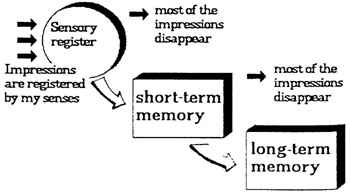does memory degenerate with increasing age?
does memory degenerate with increasing age?
When we get older our mental agility is decreased. This means that our ability to react in various situations is changed with increasing age, not dramatically, but there is a change. We get slower, up to 20 to 30 per cent slower between the ages of 20 and 80 years . This is probably due to chemical changes in the nerve cells of the brain and in the transmission of the nerve impulses.
Considerable interest has been shown in the memory abilities of elderly people. Tests generally indicate that elderly people have worse results than younger ones, but these tests have mostly been constructed by young people, for young people with perfect hearing and eyesight. Elderly people are therefore often misjudged in those tests. Given other tests where the same group of people is followed over a period of time, only small or no differences appear between the mental abilities of younger and elderly people. And if there are differences, they often don t appear until advanced age.
We generally think that our mental ability is at a peak at about the age of 20, but our logical ability, for instance, is best at around the age of 30, while our verbal ability is best around 50! Perhaps more people should join adult education?
Disease and mental inactivity have a strong negative influence on intellectual capacity. Those who are active and sharpen their intellect through the years will also keep those functions a lot longer: ˜Use it or you lose it!
If we speak about memory more specifically we ought to divide it into four separate layers : sensory register, short-term memory, long-term memory and permanent long- term memory.
The sensory register is the first memory layer and here we register the information that is taken in through the senses. The time span for this layer is very short. The information is either ˜accepted and channeled further into the system or rejected. The sensory register seems to be unchanged throughout our lives and does not deteriorate with increasing age.
In the short-term memory we store what we need temporarily, for instance a phone number. We keep it in our short-term memory as long as we need it, which could be some 10 to 20 seconds or up to a couple of minutes and then it disappears or is transferred to the long-term memory for storage. Between five and seven digits seem to be what we can normally handle without having to write them down. Short-term memory does not appear to be affected by increasing age either.
Long-term memory is, as the term suggests, a layer for long-term storage. It is very important how we code the information when we let it in to this layer. If we give it the wrong code the information will be difficult to retrieve. The capacity of this layer does change with age, but it could also be influenced by training. Later we shall see the wonders memorizing techniques can do to improve long-term memory.
Elderly people seem to have more problems than younger ones in retrieving information from this layer. The causes are probably to be found in the chemical change processes in the nerve system. It normally takes a little longer for an older person to remember than for a younger person.
Elderly people have as good a memory as younger people when it comes to recognizing things, particularly if they make use of cues. Younger people could more easily repeat in detail what they have learned, while elderly people more easily remember principles, overview and wholeness and often forget about details. Details could always be found if you need them!

Many elderly people say that they can more easily remember things that happened long ago while recent events are more difficult to remember. There is, however, no proof whatsoever that the permanent long-term memory should improve with increasing age. Most elderly people don t experience much change in their everyday routines so there are very few new things to remember.
Ageing seems to have very little effect on the ability to remember. Illness, however, has an influence, but the normal healthy ageing process does not stop anyone from learning new things all their lives!
| |
Before continuing, you could test your own memory with this list of words. Read carefully and slowly through the list once and try to remember as many words as possible. Then answer the questions on the next page “ without looking back at this page, of course!
| sun | sweat |
| pen | see |
| four | two |
| and | advantage |
| see | lawn |
| machine | shoe |
| two | blanket |
| ship | guitar |
| tomato | fish |
| see | entry |
| perfume | several |
| Queen Elizabeth | label |
| for | ink |
| sausage | street |
| automatically | liver |
Write down all the words that you remember from the list above. It does not matter if it is in the same order.
_______________________________________________________
_______________________________________________________
_______________________________________________________
_______________________________________________________
_______________________________________________________
Compare your list with the original one.
How many of the first few words did you remember?
And how many of the last five words?
_______________________________________________________
_______________________________________________________
Which words appeared more than once?
_______________________________________________________
_______________________________________________________
Did any words stand out as being totally different from the rest?
_______________________________________________________
| |
EAN: 2147483647
Pages: 63
- ERP Systems Impact on Organizations
- The Second Wave ERP Market: An Australian Viewpoint
- Context Management of ERP Processes in Virtual Communities
- Intrinsic and Contextual Data Quality: The Effect of Media and Personal Involvement
- Relevance and Micro-Relevance for the Professional as Determinants of IT-Diffusion and IT-Use in Healthcare